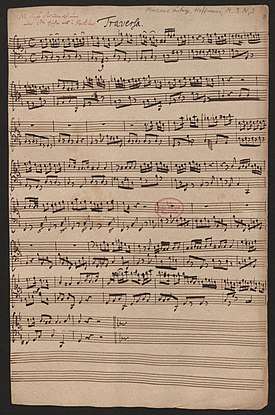Melchior Hoffmann (composer)
Georg Melchior Hoffmann (c. 1679 – 6 October 1715) was a Baroque composer who was influential as the leader at the Collegium Musicum in Leipzig. His compositions have been mistaken for those of Johann Sebastian Bach.
Melchior Hoffman | |
|---|---|
 Early 18th-century manuscript copy, likely written by Gottfried Heinrich Stölzel, of the "Traversa" part of Hoffmann's 1707 Magnificat in A minor (BWV Anh. 21, formerly attributed to Bach).[1] | |
| Born | 1679 |
| Died | 1715 (aged 35–36) Leipzig |
| Other names | Georg Melchior Hoffmann |
| Occupation | |
| Spouse(s) | Margaretha Elisabeth Philipp |
Biography
Hoffman was born sometime around 1679 (or 1685 according to some sources) in Bärenstein, Saxony, Germany.[2] His first musical service was as a choirboy in Dresden, under the tutelage of Johann Christoph Schmidt.[2] In 1702 he moved to Leipzig to study law. Simultaneously he joined Georg Philipp Telemann at the Collegium Musicum in Leipzig[2] and acted as the organization's copyist.[3] Hoffmann succeeded Telemann as director of the Collegium Musicum in 1705, a position that did not end until Hoffman's death ten years later.[4] In this position he became an educator,[5] and his students included Gottfried Heinrich Stölzel.[4] He was noted for expanding the orchestra at the Collegium to more than 40 musicians.[6] Other responsibilities included being the organist at the Neukirche, and director of the Leipzig civic opera, for which he composed several works. He is known to have journeyed to England sometime around the years 1709-1710. In 1713 he began to suffer from the malady which would eventually prove fatal.[2] He accepted a position as the organist at the Liebfrauenkirche at Halle in the spring of 1714, but resigned July 12 of that year having never served in that capacity.[2] He married Margaretha Elisabeth Philipp on 9 September 1714.[2] He succumbed to illness, in otherwise prosperous circumstances, on 6 October 1715.[2]
Style
Hoffmann's compositions have been mistaken for the work of J. S. Bach. Research has indicated that an aria for alto, Schlage doch, gewünschte Stunde, BWV 53, and the solo cantata for tenor, Meine Seele rühmt und preist, BWV 189,[7] are likely works by Hoffmann, and of more positive identification is a Magnificat for solo soprano and small group, which during the 19th century was assigned a BWV number of BWV Anh. 21.[4] Joshua Rifkin has identified Hoffman's style as having "freshness and charm" while noting the "occasional melodic angularity".[4] He has been sometimes confused with composer Johann Georg Hoffmann, although there is no relation.[2] None of his operas survive, but contemporary reviews indicate they were well received.[6] He has been identified as the first composer to use bells in a serious manner.[8]
References
- Hoffmann, Melchior: Magnificat in a-Moll at RISM website
- Oron, Aryeh; Braatz, Thomas (May 11, 2009). "Georg Melchior Hoffmann (Composer)". Bach Cantatas Website. Retrieved May 22, 2014.
- Kevorkian, Tanya (2007). Baroque Piety: Religion, Society, and Music in Leipzig, 1650-1750. Ashgate Publishing, Ltd. p. 213. ISBN 9780754654902.
- Joshua, Rifkin (1985). Bach Magnificat; Hoffman German Magnificat (CD). Pro-Arte. p. 5. CDD 185.
- Hiller, Johann Adam (2001). Treatise on Vocal Performance and Ornamentation. Cambridge University Press. p. 8. ISBN 9781139428989.
- Stevenson, Joseph. "Melchior Hoffmann Artist Biography". AllMusic. Retrieved May 22, 2014.
- Dürr, Alfred (1981). Die Kantaten von Johann Sebastian Bach (in German). 1 (4 ed.). Deutscher Taschenbuchverlag. pp. 723–724. ISBN 3-423-04080-7.
- Dearling, Robert (1996). The Illustrated Encyclopedia of Musical Instruments. Schirmer Books. p. 110. ISBN 9780028646671.
Further reading
- (in German) Stölzel, Gottfried Heinrich. "Melch. Hofmann", pp. 117–119 in Grundlage einer Ehren-Pforte, edited by Johann Mattheson. Hamburg: 1740.
External links
Literature by and about Melchior Hoffmann (composer) in the German National Library catalogue